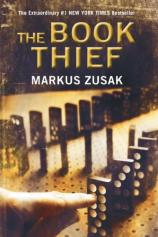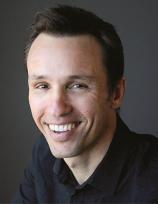Interview: September 14, 2007
September 14, 2007
Markus Zusak is the award-winning author of I AM THE MESSENGER and THE BOOK THIEF, which is now available in paperback. In this interview with Bookreporter.com's Brian Farrey, Zusak discusses the appeal of reading and writing, and describes his experience in Germany while researching THE BOOK THIEF. He also addresses the similar threads that run through his work and even shares a poignant childhood memory.
Bookreporter.com: One of your greatest successes in THE BOOK THIEF was making Death a character with depth whose musings wax philosophical at nearly every turn. How much Markus Zusak is there in Death, and vice versa?
Markus Zusak: I guess there's a little bit of death in me, but it's probably true for everyone. I think I just applied the thought of how scared I am of death and reversed it. I thought, 'What if he or she or it is haunted by everything he sees humans do?' In that way, he's also like all of us, because we all have the same reactions to each other's behavior. Also, I had more empathy for Death when he was vulnerable like that.
BRC: In "The Word Shaker," the book-within-a-book in THE BOOK THIEF, Max weaves a parable for Liesel about the power of words to at once destroy and create. In the world today, who do you think is winning --- the people who use words to destroy or the word shakers?
MZ: What a question! Probably like always, it's pretty even, and the word shakers most likely feel lonelier because the destroyers are louder. Maybe the point is also that this is internal as well as external. We all have stories about ourselves that shame us, but also ones that give us the feeling that we're okay after all.
BRC: You traveled to Germany to do research for THE BOOK THIEF. What was that experience like? What did you take away that you didn't know before you started?
MZ: It was great. I humiliated myself sometimes when I spoke German (I'm pretty rough with it), but that's all part of the experience. It was great to simply walk around the streets where the book was set --- to see the river where I'd imagined Rudy jumping in to rescue Liesel's book. Research-wise, I found some things that were impossible to find in Australia, like certain records and annoying, hard-to-get trivial information. A good example was discovering the seasonal habits of apple trees, just in case someone out there would pick me up on a mistake. On a strange note, I did something a little sentimental, or superstitious...I carved Rudy and Liesel's names into a tree with a coin. It was at the river, and my fingers were really sore by the end of it. I wonder if the names are still there.
BRC: A common thread in all your books is respect and the characters who seek it. Ruben and Cameron. Ed Kennedy. Liesel and Max. All have varying degrees of success. Do you believe that the need for respect is a trait inherent in humans, and, if so, how have you seen that trait bring out the best and worst in your life?
MZ: I've never thought of the similarities between the books in that way, but I think I equate that idea with hunger. The Wolfe brothers are hungry to survive and prove themselves to the world and each other. Ed delivers people from one spiritual place and sense of self to another. And Liesel and Max show love and respect by sharing stories. As for myself, I only know that writing has given me that sense of self worth. Without writing and stories, I know I'd be miserable. I'm just lucky I decided early on what I wanted to do. Also --- and to finally answer the question now --- I think that a sense of respect is definitely inherent in humans. I guess we all want that kind of affirmation, from other people and from ourselves.
BRC: In a 2006 interview you said, "It's the little stories that define us, our existence." What's the littlest story you can tell about Markus Zusak that helps define you and your existence?
MZ: God --- these questions are incredible (in a good way)!
One of my best memories of growing up is catching my first proper wave, surfing across it, with my brother cheering from the shore. My brother and I hated each other and loved each other, but that small memory shows me that we were really best friends.
BRC: How do the responses to your books from readers differ in Australia from the responses in the US? How are they similar?
MZ: I've actually noticed no differences at all. I just seem to get more responses from America, since it's a much bigger country.
BRC: Talk about your discipline as a writer. What routines/habits do you have for where you write, when you write, and how you write?
MZ: I try to write in the mornings, from about 7 till 11:30, then have a long break, then maybe do another few hours later in the afternoon. That changes towards the end of a book, when the hours become a lot longer. There's also a lazier routine, usually in summer, when I'm more likely to start work around 10 and move everything back. That's usually just because I picked up surfing again and go early in the mornings.
BRC: You've described THE BOOK THIEF as a challenge to write, taking nearly three years to complete. What sorts of writing challenges do you embrace? What challenges, if any, do you shy away from?
MZ: I'm basically a non-confrontational person. I shy away from blowing my horn at someone in the car (I think I've done it three times). I also agree with people rather than argue --- I can't help it. As for writing challenges, I don't know. I guess I shy away from writing certain genres. Fantasy. Crime, and so on. The challenge I take on is no different from any writer --- the doubt. Struggling to believe that the book is working is the greatest problem, but if it wasn't there, finishing a book wouldn't be the achievement that it is.
BRC: When you sit down to write, how much do you know about the story and the characters before you start, and how much of it comes from the process of experimentation while writing?
MZ: I generally have the start and the end first. Then I have other kinds of check points I want to go through. It's a bit like running a race, but once you've gone through each stage, you find that things will move around. You'll need to do certain parts up to a hundred times before you can move on. You might even find the end a little to the left or right than you originally planned. A good example of that is THE BOOK THIEF. Originally, Liesel was going to be arrested for book thievery, but when I made it to the end, it simply wasn't right.
BRC: THE BOOK THIEF is, among other things, a love letter to books, writing, and the power of words. What excites you when you write?
MZ: I love the idea that there can be one gem on every page of a book. It can be an image, an idea or a piece of dialogue --- anything. If there's one gem on every page of a hundred-page book, that's a hundred good reasons to read it.
BRC: What three elements does a book need in order to grab your attention as a reader? What are you reading these days that's making you take notice?
MZ: The first thing is the gems I just mentioned, the second would be story. While it's nice to have the gems, if the story doesn't captivate me, it makes finding the great images that little bit harder. Lastly, I think voice. Someone once told me that voice is everything, and they were probably right. If you can hear the characters or the narrator talking, they can almost tell you anything and you will go with them. The Australian classic CLOUDSTREET, by Tim Winton, is all of the things I've just mentioned.




